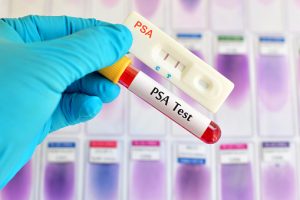 Prostate-specific antigen (PSA) screening has been linked to a reduction in death from prostate cancer. The current guidelines for PSA screening outlined by the United States Services Task Force advised against PSA screening for prostate cancer, as there has been a lack of evidence to support if it reduces death rates. Current findings have now uncovered that PSA screening, in fact, does help reduce death by prostate cancer.
Prostate-specific antigen (PSA) screening has been linked to a reduction in death from prostate cancer. The current guidelines for PSA screening outlined by the United States Services Task Force advised against PSA screening for prostate cancer, as there has been a lack of evidence to support if it reduces death rates. Current findings have now uncovered that PSA screening, in fact, does help reduce death by prostate cancer.
Prostate cancer is the second most common type of cancer among males behind skin cancer. It is estimated that 26,730 men will die from prostate cancer this year alone.
Advertisement
Men over the age of 65 are at the highest risk of developing prostate cancer.
PSA screening
PSA screening checks for levels of prostate-specific antigen in the blood—this is produced naturally by the prostate. Men without prostate cancer will have PSA levels of four nanograms per milliliter. PSA levels between four and 10 nanograms per milliliter have a one in four chance of developing prostate cancer. PSA levels over 10 are associated with a 50 percent chance of developing prostate cancer.
PSA levels aren’t just affected by prostate cancer. Levels can vary due to urinary tract infections along with some medications. For this reason, doctors are wary of PSA screening, as it can create false-positives, which can put men through unnecessary stress and treatment.
Update needed for PSA screening guidelines
The researchers of the latest study suggest that current guidelines for PSA screening should be reviewed and possibly changed in light of the findings. The results of the findings were obtained from two studies: European Randomized Study of Screening for Prostate Cancer (ERSPC) and the Prostate, Lung, Colorectal, and Ovarian Cancer Screening Trial (PLCO).
The findings from the ERSPC study found that PSA screening was linked to a significant reduction in death from prostate cancer where the PLCO study did not find a significant benefit to PSA screening.
Advertisement
Further analysis of both studies using a mathematical model did uncover that both studies demonstrated a significant reduction in prostate cancer death through PSA screening compared to men who did not undergo PSA screening.
Based on the findings, the researchers suggest that current guidelines surrounding PSA screening be updated.
Related: Prostate health update: Enlarged prostate, prostatitis, prostate cancer risk
